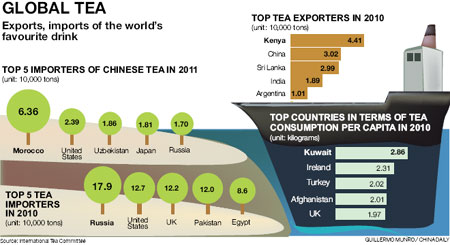Local beverage may not be everyone's cup of tea
Updated: 2012-03-27 08:00
By Tang Yue and Zhang Yuchen in Beijing (China Daily)
|
||||||||
More than business
But, despite the rise of tea shops and related centers across the US and Europe during the past decade, no company from the Chinese mainland has yet opened an overseas outlet.
"We should be open-minded and take it (the rise of tea shops overseas) as positive news," said Sun Danwei, general manager of Beijing Wuyutai Tea, a 125-year-old brand that owns 270 shops in China.
"They are promoting knowledge of tea all over the world and preparing customers for quality tea," said Sun, whose company is planning to open a store in Hong Kong as a first step to entering the market outside the mainland.
Recognizing the growing demand, the US-based coffee giant Starbucks has launched a variety of tea-related products in recent years. In response, Chinese companies such as Wuyutai are also attempting to broaden their appeal to younger consumers by producing tea-flavored ice cream and also developing applications for Apple electronic products providing subscribers with the latest news from the industry, and instructions on how to brew the perfect cup. It has also opened a restaurant in Beijing that serves a range of dishes in which tea is used as a flavoring or major ingredient.
"It is not only about selling tea. It's about everything to do with tea: The drink itself, the history, even the pots used in its preparation. The Japanese are doing a better job than us," Sun said, referring to the vast numbers of tea shops and centers on the streets of China's neighbor to the east.
She admitted that it can be something of an effort to explain the cultural significance of tea to foreigners, but once they become interested, she said, many find it fascinating.
"The government should take full advantage of existing networks such as the Confucius Institutes (government-backed organizations that promote the Chinese language and culture overseas) to push China's tea culture across the world. The task is too difficult for individual companies to undertake at the present time."
Song Heng, an enthusiast who has published four books on China's tea culture, is upbeat about the future. He believes that the country's increasing economic power means that the eyes of the world are increasingly drawn to all things Chinese.
"I often drink tea with foreigners, but I rarely see them drink it slowly and savor it wholeheartedly as the Chinese do. They can't understand why Chinese people like to spend so much (time and money) on quality tea.
"But I believe it will change, things always do: At one point, Chinese people didn't drink coffee, but white-collar workers are drinking it a lot nowadays, and historically the Chinese didn't drink wine, but now they are willing to pay good money for a decent bottle," said Song.
"Chinese tea is set to regain its popularity overseas, because more people are becoming interested in the country and tea is an integral part of our culture."
 |

 Relief reaches isolated village
Relief reaches isolated village
 Rainfall poses new threats to quake-hit region
Rainfall poses new threats to quake-hit region
 Funerals begin for Boston bombing victims
Funerals begin for Boston bombing victims
 Quake takeaway from China's Air Force
Quake takeaway from China's Air Force
 Obama celebrates young inventors at science fair
Obama celebrates young inventors at science fair
 Earth Day marked around the world
Earth Day marked around the world
 Volunteer team helping students find sense of normalcy
Volunteer team helping students find sense of normalcy
 Ethnic groups quick to join rescue efforts
Ethnic groups quick to join rescue efforts
Most Viewed
Editor's Picks

|

|

|

|

|

|
Today's Top News
Health new priority for quake zone
Xi meets US top military officer
Japan's boats driven out of Diaoyu
China mulls online shopping legislation
Bird flu death toll rises to 22
Putin appoints new ambassador to China
Japanese ships blocked from Diaoyu Islands
Inspired by Guan, more Chinese pick up golf
US Weekly

|

|







